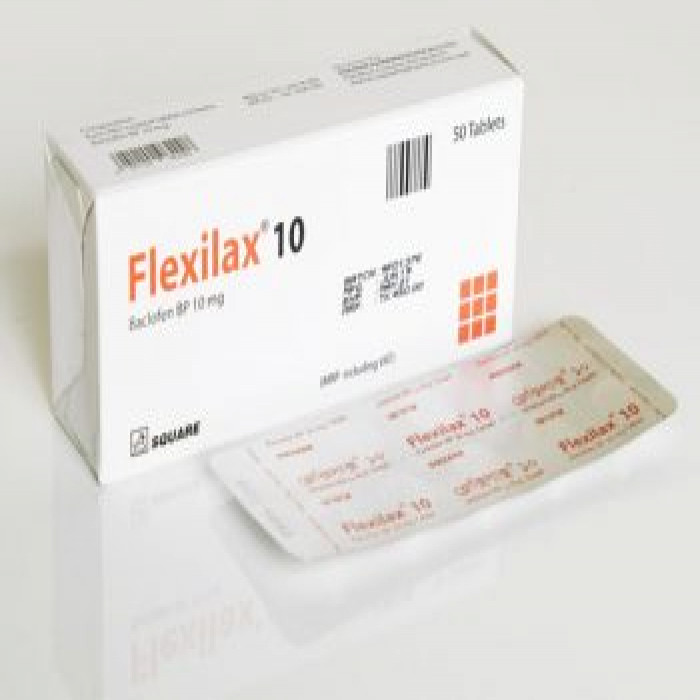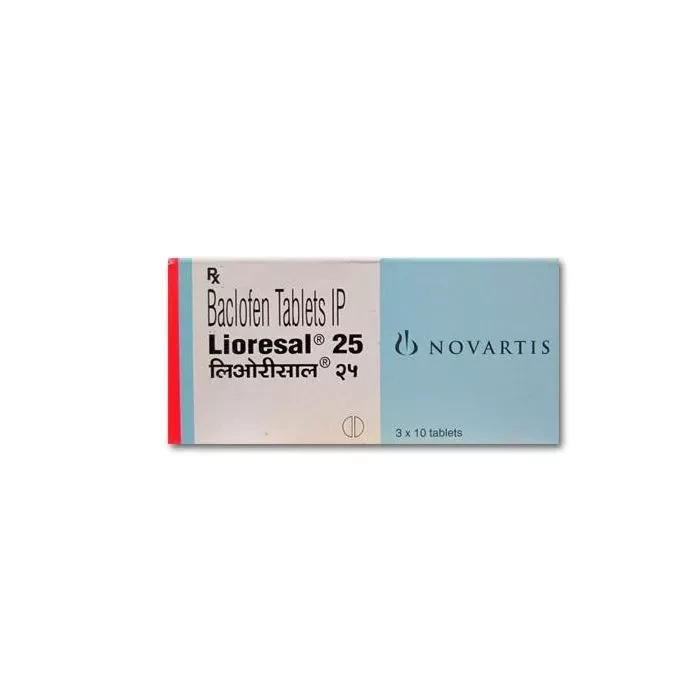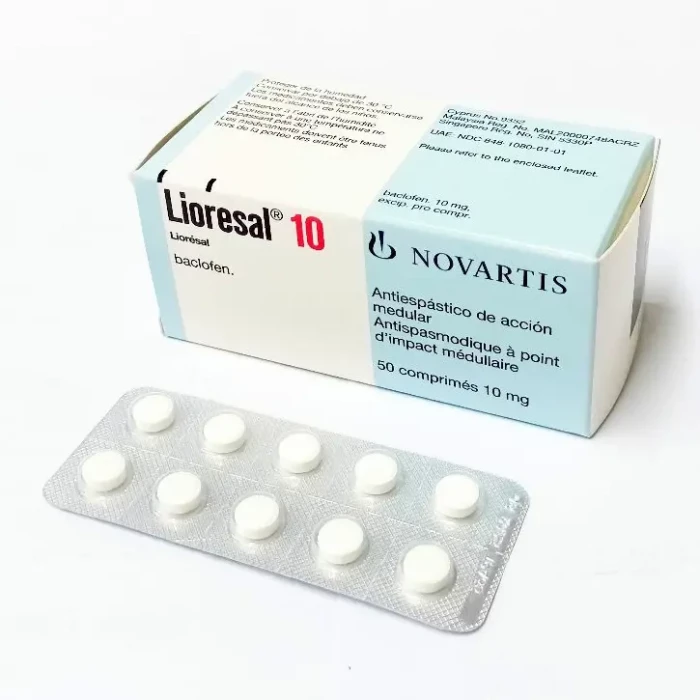
✔ 100% Authentic Product
👁️ Currently Viewing 2159
Baclofen 25mg manage muscle spasms (painful muscle contractions)
Discount
Price: ৳ 197
MRP:
৳
201
2%
Off

100% Genuine Products, Guaranteed

Safe & Secure Payments, Always

Fast, Secure & Efficient Delivery

Proper Packaging
 Cash on Delivery - All over Bangladesh
Cash on Delivery - All over Bangladesh Regular Delivery - 12-24 Hours, Dhaka City* Charge Tk.39-59
Regular Delivery - 12-24 Hours, Dhaka City* Charge Tk.39-59 Regular Delivery - 24-48 Hours, Other Cities* Charge Tk.99-110
Regular Delivery - 24-48 Hours, Other Cities* Charge Tk.99-110
🌙 রমযান অফার 🌙
 ফ্রি ডেলিভারিঃ - ৭৯৯ টাকা+ অর্ডারে, ঢাকা
শহরে
ফ্রি ডেলিভারিঃ - ৭৯৯ টাকা+ অর্ডারে, ঢাকা
শহরে ফ্রি ডেলিভারিঃ - ২৭৯৯ টাকা+ অর্ডারে, ঢাকার
বাহিরে
ফ্রি ডেলিভারিঃ - ২৭৯৯ টাকা+ অর্ডারে, ঢাকার
বাহিরে
📲 মোবাইল অ্যাপ অর্ডারে সাশ্রয় বেশী
-
Google Play Store থেকে ডাউনলোড
-
Apple Store থেকে ডাউনলোড
100% Genuine Products, Guaranteed
Safe & Secure Payments, Always
Fast, Secure & Efficient Delivery
Proper Packaging
 Cash on Delivery - All over Bangladesh
Cash on Delivery - All over Bangladesh Regular Delivery - 12-24 Hours, Dhaka City* Charge Tk.39-59
Regular Delivery - 12-24 Hours, Dhaka City* Charge Tk.39-59 Regular Delivery - 24-48 Hours, Other Cities* Charge Tk.99-110
Regular Delivery - 24-48 Hours, Other Cities* Charge Tk.99-110 ফ্রি ডেলিভারিঃ - ৭৯৯ টাকা+ অর্ডারে, ঢাকা
শহরে
ফ্রি ডেলিভারিঃ - ৭৯৯ টাকা+ অর্ডারে, ঢাকা
শহরে ফ্রি ডেলিভারিঃ - ২৭৯৯ টাকা+ অর্ডারে, ঢাকার
বাহিরে
ফ্রি ডেলিভারিঃ - ২৭৯৯ টাকা+ অর্ডারে, ঢাকার
বাহিরে- Google Play Store থেকে ডাউনলোড
- Apple Store থেকে ডাউনলোড
🌙 রমযান অফার 🌙
📲 মোবাইল অ্যাপ অর্ডারে সাশ্রয় বেশী
✅ Description:
Flexibac 5mg Tablet is a muscle relaxant used to treat muscle rigidity, tension, and stiffness due to conditions like cerebral palsy, multiple sclerosis, motor neuron disease, or brain/spine injury. It should be taken with food and used in the smallest effective dose for the shortest possible time. Regular dosing is essential for effectiveness. Flexibac 5mg Tablet may cause excessive sleepiness. During management with Flexibac 5mg Tablet, your doctor will periodically monitor your health condition through several blood tests and urine tests to avoid the risk of unwanted side effects.
Safety Advices

Alcohol
UNSAFE
May cause excessive drowsiness when combined with alcohol.

Pregnancy
CONSULT YOUR DOCTOR
Animal studies indicate potential harm to the developing baby; the doctor must weigh the benefits and risks.

Breastfeeding
CONSULT YOUR DOCTOR
Human studies suggest minimal passage into breastmilk, unlikely to harm the baby.

Driving
CAUTION
May decrease alertness, affect vision, or cause sleepiness and dizziness. Do not drive if these symptoms occur.

Kidney
CAUTION
Dose adjustment may be required. Consult your doctor.

Liver
CAUTION
Dose adjustment may be required. Consult your doctor.
✔️ Uses of Flexibac 5mg Tablet
- Muscles Spasms
✔️ How does Flexibac 5mg Tablet work?
Baclofen, the active ingredient in Flexibac 5, inhibits monosynaptic and polysynaptic reflexes at the spinal level.
✔️ Side Effects of Flexibac 5mg Tablet
- >10%: Drowsiness (10-63%), dizziness (5-15%), nausea (4-12%), confusion (1-11%).
- 1-10%: Headache (4-8%), insomnia (2-7%), constipation (2-6%), urinary frequency (2-6%), fatigue (2-4%).
- <1%: Abdominal pain, ankle edema, anorexia, ataxia, blurred vision, chest pain, coordination disorder, depression, diarrhea, dry mouth, diplopia, dysarthria, dyspnea, dystonia, enuresis, euphoria, excitement, hallucinations, hematuria, hypotension, impotence, miosis, muscle pain, mydriasis, nasal congestion, nocturia, nystagmus, palpitation, paresthesia, excessive perspiration, pruritus, rash, rigidity, seizure, strabismus, slurred speech, syncope, tinnitus, tremor, urinary retention, vomiting, weight gain.
- Potentially Fatal: Respiratory or cardiovascular depression, seizures.
✔️ Quick Suggestions:
- Provides relief from muscle spasticity.
- Take with food or milk.
- May cause dizziness or sleepiness; avoid driving until you know how it affects you.
- Avoid alcohol due to increased drowsiness risk.
- Inform your doctor if pregnant, planning to conceive, or breastfeeding.
- Do not stop suddenly without consulting your doctor if on long-term use.
✔️ Indications
✔️ Pharmacology
✔️ Dosage & Administration
- Adults: Start with 5 mg three times daily (tid) for 3 days, then increase to 10 mg tid. Gradually increase until desired effect or 20 mg tid. Maximum: 80 mg daily. Lower doses for the elderly.
- Children: 0.75-2 mg/kg daily. Start with 2.5 mg four times daily, increasing gradually every 3 days. Maintenance dose varies by age:
- 6-10 years: 30-60 mg daily.
- 2-6 years: 20-30 mg daily.
- 12 months years: 10-20 mg daily.
- Maximum for >10 years: 2.5 mg/kg daily.
- Renal Impairment: Dose reduction may be necessary.
- Take as prescribed by the doctor. Swallow whole with food; do not chew, crush, or break.
✔️ Interaction
- With antihypertensives: Increased hypotensive effect.
- With levodopa in Parkinson’s patients: Potential confusion, agitation, hallucinations.
- Potentially Fatal: CNS depressants and alcohol can potentiate CNS effects.
✔️ Contraindications
- Hypersensitivity.
- Active peptic ulcer disease.
✔️ Pregnancy & Lactation
- Pregnancy: No adequate human data; increased risk of fetal abnormalities in animal studies. May cause late-onset neonatal withdrawal symptoms.
- Lactation: Baclofen is present in human milk at recommended doses. No data on the effects on milk production or the breastfed infant. Withdrawal symptoms are possible when maternal administration or breastfeeding stops. Consider the benefits of breastfeeding along with maternal needs and potential adverse effects.
✔️ Precautions & Warnings
- Patients with cerebrovascular disorders, epilepsy, severe psychotic disorders, confusion, peptic ulcer history, respiratory depression, diabetes, hepatic or renal impairment, and elderly.
- Avoid sudden withdrawal.
- Not recommended during lactation due to small amounts entering breast milk.
✔️ Storage Conditions:
Store below 30°C
⚠️Disclaimer:
At ePharma, we’re committed to providing accurate and accessible health information. However, all content is intended for informational purposes only and should not replace medical advice from a qualified physician. Please consult your healthcare provider for personalized guidance. We aim to support, not substitute, the doctor-patient relationship.






















